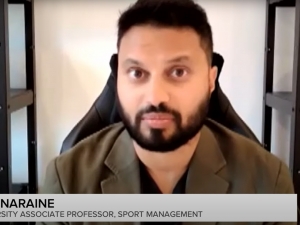Brock University Professor of Psychology and Neuroscience Veena Dwivedi had a piece recently published in the Globe and Mail about factors that impact language use and development amid conversations about preserving French in Quebec.
She writes:
“Any anglophone Montrealer will tell you that one of the hardest things to do upon leaving our beloved hometown is first, to learn that there are no kisses on any one’s cheek when saying hello, and second, learning to not switch into French as you speak. I had to stop myself from saying “merci” to the bus driver while living in the U.S. as a graduate student; and it was a couple of years into teaching my classes here at Brock that one of my teaching assistants from South Korea very politely asked me what “comme ҫa” meant. My colleagues here never talk about the “subventions” that they are applying for, whereas my McGill colleagues would regularly talk about grant applications in that way.
Here’s the thing: When two linguistic communities live side-by-side for generations, each community borrows words from the other. A recent social media post made by the Quebec minister responsible for promoting and protecting French, Jean-François Roberge, implies that this natural process leads to language extinction. That is, the supposedly humorous 30-second video features a peregrine falcon, a species that has been at risk of extinction and for which conservation efforts are under way. The French voice-over describes the bird as “super quick en vol” (in flight) and continues to sprinkle sentences with other borrowed English words like “sick,” “chill” and “insane.”
The minister is completely wrong that switching between languages, and/or borrowing words from one language into another kills the language. It doesn’t kill the language; it changes the language. We tend to equate linguistic systems with writing systems – while these are related, these are not identical. Language is learned anew by every generation of babies in their communities and every time a baby learns their language, it’s never quite the same as it was in the previous generation. The biggest linguistic innovators, however, are teenagers. Teenagers need to separate from their parental tribe, and they do so very creatively via language to create their own in-group. Again, this is a perfectly normal developmental milestone in language. It can’t be stopped.”
Continue reading the full article on the Globe and Mail website.








